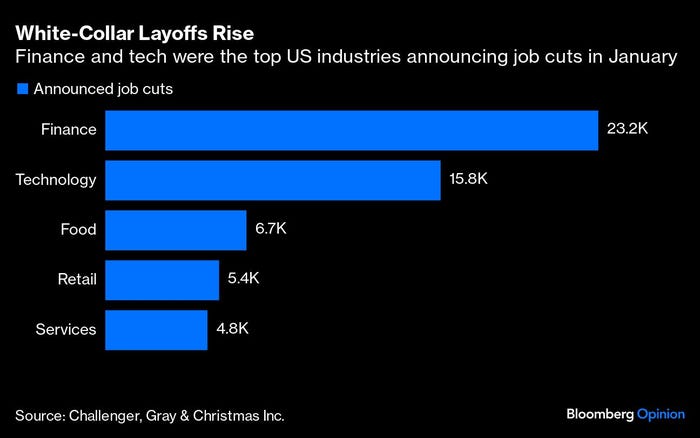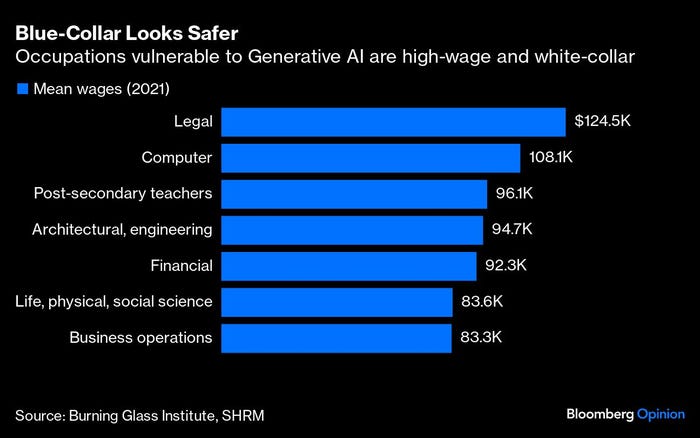Coders and Analysts Feel AI's Breath on Their Necks
Nobody's really ready for how automation could upend white-collar drudgery.
February 8, 2024

(Bloomberg Opinion/Lionel Laurent) — Are white-collar workers — think analysts, coders and even the odd opinion columnist — going the way of the medieval scribe? Finance and technology accounted for around 39,000 announced layoffs in the US last month, according to one survey, and now DocuSign Inc. and Snap Inc.'s 900 more signal an ongoing race to "rip the Band-Aid" and pivot to more cost-effective AI and automation. Developers are quoting Marx in online forums and wondering if they should re-train as electricians.
Shareholders don't seem too bothered, as seen by Meta Platforms Inc.'s recent whopping $197 billion one-day market-cap gain, and neither do politicians eager to catch up in the tech race. After all, with unemployment still low, no Luddites in sight and plenty of demand, it's easier to talk up the potential for AI to boost productivity and economic growth. The technology will not be a "mass destroyer of jobs," Bank of England boss Andrew Bailey recently told the BBC.

white-collar-layoff
Yet simply hoping for the best is an inadequate response to the potential upheaval AI could unleash in the labor market. A raft of research is starting to scratch the surface of what goes on when AI is rolled out into the world of white-collar drudgery. Not all of it is pretty.
Experiments so far have focused on the kind of routine text-based tasks that generative AI seems best-placed to handle — like programming, professional writing and customer support guidance. Encouragingly, this technology seems to work better as a companion to workers rather than as a replacement for them. One study looking at Microsoft Corp. and OpenAI's GitHub Copilot, an AI assistant that offers coders suggestions and prompts, found that those using the tool completed a task on average 55.8% faster. Another study found that workers using ChatGPT for tasks including press releases or analysis plans completed them 10 minutes faster and also saw quality rise. And another found that customer support agents using AI assistants completed 14% more tasks per hour.
These studies also suggest AI's gains flowed more to workers with less experience (which may explain why tech's Young Turks seem keener on these tools versus the old guard). The optimistic reading here is that instead of cutting a swathe through the office, AI could be a productivity tool that educates and trains those lower down the ladder while also freeing up more time for older colleagues. Computer scientist J.C.R. Licklider imagined this kind of ideal "Man-Computer Symbiosis" in 1960, complaining that 85% of his thinking time was spent "getting in a position to think" by recording information or arranging it, like plotting graphs, instead of on more productive work.
But it's not all rosy. Controlled experiments don't necessarily tell us what happens at scale. For example, users of Copilot report there is a need to check for and catch bugs — the tool is after all reliant on large-language models, which aren't immune to getting things wrong. Experienced coders are going to be better at this. "(Copilot) lifts everyone up a little bit, but if you're a poor programmer you'll still have weaknesses," Noah Gift, lecturer at Duke University, told the MIT Technology Review. The potential for negative feedback loops involving inexperienced coders could be so costly that the skills bar for employment gets raised even higher. And on the flipside, the power of AI could augment the best workers so much that fewer humans are needed.

blue-collar-layoff
There's also the question of whether faster content creation ends up devaluing creators and depressing wages rather than boosting demand. "Even if AI benefits those with a lower level of skills, it doesn't mean everybody benefits," says Oxford Martin School Professor Carl-Benedikt Frey. He cites the example of Uber Technologies Inc. and its lowering of barriers to entry into ride-hailing services, which saw more people sign up and lower earnings for incumbent drivers. The IMF last month warned that jobs in advanced economies were especially exposed to AI and the risk of reduced labor demand, lower wages and reduced hiring. Some jobs might simply disappear.
None of this is to say that we should panic over a jobs Armageddon. In the long run, we may look back and wonder how we ever got on without AI. But how we manage the short run is vital if it leads to rising inequality and lower wages. Pleas to "reskill" or "learn Python" will start to sound like platitudes in a world where machines can write code but can't fix a leaky faucet.
What should be done? Three ideas seem worth pursuing. One is to keep a tight regulatory leash on the top providers of AI who dominate this "uniquely exploitative" technology, as former StabilityAI exec Ed Newton-Rex puts it, to avoid workers' data getting unduly hoovered up by the machine. The second is to create new tasks around AI to spread its gains, perhaps by on-shoring its supply chain such as the making of the chips that power it. The third is to ensure there's a social safety net for those who need it, such as universal basic income.
And if all else fails, hand me that wrench
About the Author(s)
You May Also Like




